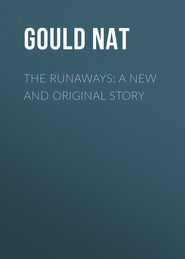По всем вопросам обращайтесь на: info@litportal.ru
(©) 2003-2024.
✖
The Second String
Настройки чтения
Размер шрифта
Высота строк
Поля
Jack Redland won a large sum, and half of this was to go to Barry Tuxford. Job Seagrave landed a couple of hundred pounds, and was jubilant.
The stewards could not let the previous running of Black Boy pass unchallenged, and called Abe Moss before them to give an explanation of the horse's performances during the time he owned him. Abe made some blundering excuses, which only half satisfied the stewards, and wound up by saying he had backed Lucky Boy in the Cup, as he did not consider the winner good enough. This was perfectly correct, and probably thinking he had been sufficiently punished by losing his money, the stewards gave him a severe caution, and warned him to be careful how he acted in the future.
Jack was naturally anxious to hear from Barry Tuxford, but there was nothing for it but to wait patiently until he communicated with him.
He lost no time in paying a visit to the "Falcon" and renewing his acquaintance with his old friends of the "Golden Land." Sam Slack and Rufus Macdonald gave him a hearty welcome, and the latter said the skipper was a "canny mon" to land the "Falcon" in port in time to back Black Boy in the Cup. "It's a pity we were not there," he said.
Jack dined with them on board, and they spent several merry evenings together, until the time came for the "Falcon" to commence her homeward voyage.
Captain Seagrave willingly took charge of several parcels Jack wished to send to Winifred and Sir Lester, he also entrusted to Job a splendid photograph of Black Boy, with Sleath in the saddle, and the black and orange colours up.
When the "Falcon" left the harbour Jack felt more lonely than he had ever done since he landed in Australia, and it was with a feeling of intense relief he received a letter from Barry Tuxford some weeks after Black Boy had won the Cup.
Barry wrote in high spirits, he had nothing but good news to tell. His man had not exaggerated in the least, and he reckoned their claims would be about the richest in Western Australia.
"The country, as you may expect, is infernal," wrote Barry, "not fit for a civilised white man to live in, but where gold is to be found there do the people flock together, and it was not long before they were on my track after the first gold went on to the Great Tom township, and the Warden had granted our claims. You have never been in a gold rush and I hope you never will. It is hell let loose, every man for himself and the devil take the hindmost. All the worst features of the human race come to the surface; if a man has any of the leven of unrighteousness in him it's bound to ooze out in a big lump. I have seen some very choice collections of blackguards in my time but I never set eyes on such a crew as we have had up here at Bundoola Creek. They are the scum of the earth, and although there are some good fellows amongst them, the majority ought to be in gaol. You know me fairly well, and that I am not easily staggered, but I tell you candidly when I looked round on the crew that rushed the Creek I felt a trifle uncomfortable. We had secured the best claims, and the fellows knew it, and this raised their ire. They saw there was gold on our pitches to be had almost for the asking, and they wanted some of it. I was equally determined they should not have it. I took with me, from the township, a dozen men I could depend upon, and to make doubly sure of them I gave them a hint where to peg out their ground. This gave them an interest in the concern and as they were all well armed the rogues and vagabonds would have had a rough time of it had they ventured to interfere with us. Things have settled down a bit now, and as there is plenty for all I see no reason why the peace should not be kept.
"As for the claims, I have called one the 'Redland,' and the other the 'Barry Tuxford,' so we stand a good chance of becoming famous all the world over, for sure as fate these will be big concerns. I have just heard Black Boy won the Sydney Cup, and you cannot think how delighted I am. For a middle aged man I acted in a most absurd way. I danced around the camp like a wild man, and my pals thought the heat had affected my brain. When I explained what had occurred they understood, they are all good sports. What a triumph, Jack, and what an awful scoundrel Abe Moss must be. I don't know how my horse ran, and don't much care, now you won. If Joel Kenley thinks Lucky Boy will win a race let him keep him in training, if not, sell him for what he will bring. Thank him for all he has done for us, and give him a bonus of a hundred pounds as a slight token of my regard. There is no secrecy now about my movements, and you may tell anyone you like where I am, and what has happened, providing they do not already know.
"Come back to Fremantle as soon as you feel inclined, as I have a lot to say to you about our future prospects. I advise you to leave Black Boy with Kenley, or sell him if you think it best. I shall be glad to see you again; you cannot understand how I miss you. Have had no news of the pearling fleet, but expect they will be back soon. By the way, the only bit of inferior news I have is that old Silas Filey has gone on a trip to Shark's Bay. What the deuce takes the old fellow to that outlandish place I do not know, but he has taken the black pearl with him or else hidden it somewhere. Wait until he comes back and if he does not give it up, I'll throttle the life out of him. Another item of news. I saw that black thief, Kylis, in Fremantle, and he is in funds. Where he got the money from the Lord knows; but he had the cheek to ask me to assist him in fitting out a schooner. He said he had over a hundred pounds, and would I advance him the rest. As we were not near the harbour, or the river, I had no opportunity of pitching him into the water, but he evidently understood the meaning of my language and cleared off with a rapidity seldom seen in the black race. You need not trouble about the pearl, Silas is sure to have it safe, and I will get it when he returns."
Jack Redland went to Joel Kenley's, taking the letter with him, and read it to the trainer.
"Now you will understand why I could not tell you where he had gone," said Jack, as he finished Barry's epistle.
"You were perfectly right to keep everything to yourself," replied Joel. "It is very good of him to send me a hundred pounds."
"You deserve that and more, and I hope you will not refuse if I offer you another hundred to match it."
"I shall not refuse," replied Joel, "for I know the spirit in which it is offered."
"Will you take charge of the horses while I am away?" asked Jack. "I leave for Fremantle by the next boat."
"Willingly; they are both worth keeping in training, and will pay their way."
"You must run them when you like," said Jack. "Please use them as though they were your own, and I will leave a couple of hundred pounds to your credit to back them with."
"I will do my best," said Joel, who appreciated the confidence placed in him.
Bricky came in for his share of the plums, and found himself in possession of a far larger sum than he had been accustomed to handle of late years. Fred Manns, the head lad, had no cause to grumble, nor had either of the jockeys who rode "the two boys."
"I told you he was a good sort," said Bricky.
"He is," replied Fred Manns, "one of the very best."
It was now public property in Sydney that Barry Tuxford had left suddenly to claim the best part of the Bundoola Creek Mines, and Jack Redland was congratulated on all sides at being the partner of such a successful man.
"I am not his partner," said Jack, "at least I have put no money into these claims."
"He's called one claim after you, and another after himself, so there can be no doubt about it," was the reply.
The voyage to Fremantle was tedious to Jack, owing to his impatience to meet Barry, and hear the news from his own lips. At last the steamer entered the harbour and he at once went ashore and straight on to Perth.
Barry was not there, but was expected down in the course of the week, so Jack had to pass the time as best he could. He went back to Fremantle in the hope that he might come across Silas Filey, and had not been long there when he met the black, Kylis. The fellow grinned when he saw him, and Jack felt inclined to knock him down. He smothered his anger and beckoned to him. Kylis sauntered across the road and asked what he wanted.
"Tell me how you stole the black pearl out of my waist-belt," said Jack, quickly, and holding him by the arm.
The black cowed under his angry gaze, and said in a low voice that he would do as he wished, providing no harm came to him.
"No one shall touch you, tell me everything," said Jack.
Kylis told the story of the robbery and of the sale of the pearl to Amos Hooker, also how Hooker parted with it for a hundred pounds to one of Silas Filey's men. He did not say anything about Hooker's death.
All this was interesting to Jack, who wondered at the black's cunning.
"You are a dangerous fellow, Kylis," he said. "Mind and keep out of trouble in future, here's a sovereign for you."
The black took it with many expressions of gratitude, and then walked rapidly away.
At last Barry Tuxford returned to Perth, and after a hearty greeting between them Jack saw he was much altered and that he had suffered a good deal in health. He was not the same lively Barry Tuxford who had left him in Sydney, and Jack was troubled.
"You are ill, Barry," he said, anxiously. "You have overworked yourself, you must rest and have a doctor to see you at once."
"I'm all right, Jack," he said, faintly, "a bit knocked up, that's all; I shall soon get over it, but I've had a hard job, a precious hard job."
Barry Tuxford was seriously ill, and when the doctor saw him he said that complete rest and change was what he required.
"He has a constitution of iron," said the doctor, "or he would have knocked up weeks ago. I warned him of the risk he was running the last time he was here, but when a man has the gold fever on him the fear of death will not stop him. He is your friend, Mr. Redland. From what he has told me I know you have more influence with him than anyone, you must make him give all this up for a time. Take him to England for a trip, the voyage will do him more good than all the medicine I can give him. Once you get him safely out to sea he cannot give you the slip, but he'll do it here if you do not watch him closely. I never met such a man before, he's all activity, and his courage is marvellous."
"Is he in any danger?" asked Jack.
"No, not at present, but if this sort of work goes on I will not be answerable for his health, or life. Do as I advise you, get him away from it all. Make him go, he has plenty of money and it will be of no use to him if he loses his health."
"I will do my best," said Jack. "He has promised to go to England with me when I return, and although I did not mean to go back for a year or two, I will tell him I have decided to take the trip as soon as possible."
"That's splendid," said the doctor. "If Barry has given you his promise he will keep it; I never knew him break his word."
CHAPTER TWENTY-NINTH
BOUND FOR HOME
"Barry, I must have a serious talk with you," said Jack.
"All serene, fire away. That blessed doctor has been at you, I can see it in your face," he replied with a smile.
"You are ill, it is no use trying to hide it. Because you have never been laid up before you fancy it will go on all right till the end of time, but it won't. You must rest. All your life you have been a hard worker, and now you are run down."
"How the deuce can I rest with these mines on our hands? It is too good a thing to leave go of now we have got the grip. Wait until I have settled this business and then I am your man."









